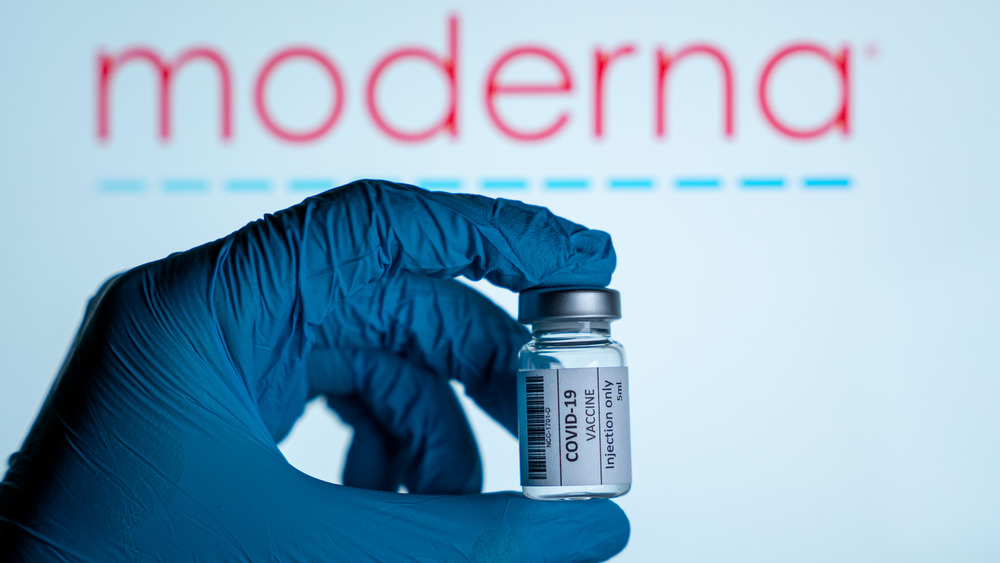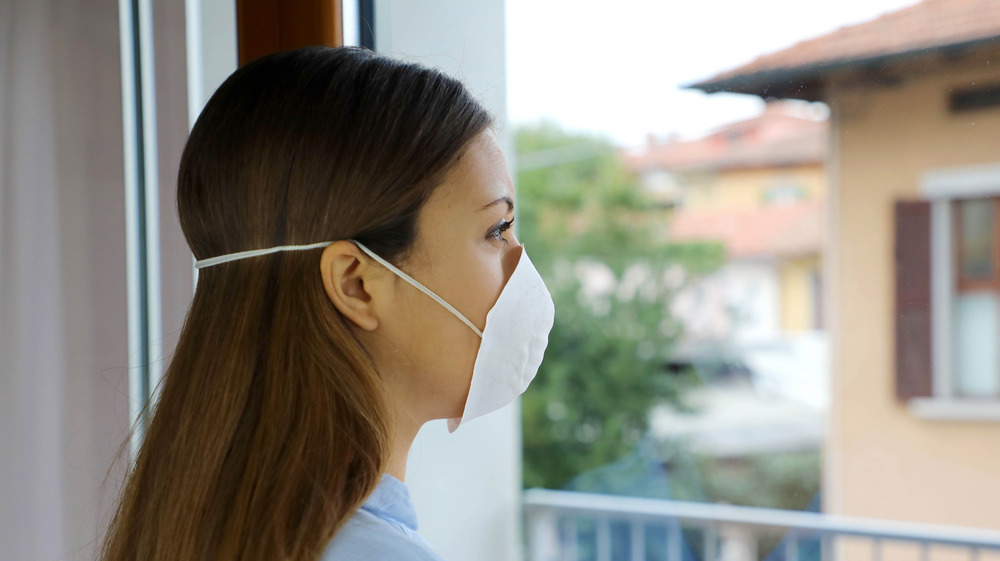Side Effects Of The Moderna Vaccine For COVID-19 Explained
Three vaccines against COVID-19 have been made available to the public as of March 2021. None have yet earned formal approval by the U.S. Food and Drug Administration (via FDA), but each is subject to an "emergency use authorization" (EUA). That means members of the public may receive the vaccine in advance of FDA approval. On December 18, 2020, the COVID-19 vaccine developed by biotech company Moderna (mRNA-1273) received its EUA, making the vaccine available to adults 18 and older. In a press release issued that day, the FDA stated that "the totality of the available data provides clear evidence that the Moderna COVID-19 vaccine may be effective in preventing COVID-19 ... [and that] the known and potential benefits outweigh the known and potential risks."
But what are those "known and potential" risks? For that matter, what are even the "known and potential" benefits that are worth the risk? Read on to learn what you're getting into (immunity, side-effects, and, of course, the benefits, etc.) when you decide to get the Moderna vaccine.
How well does the Moderna vaccine even protect against COVID-19
A significant issue the FDA considered prior to issuing its emergency use authorization (EUA) for the Moderna vaccine for COVID-19 is the vaccine's effectiveness. In a press release announcing the EUA of the Moderna vaccine, the FDA pointed out that some of the data on which it had relied in granting the EUA included a study involving 28,207 people in the U.S. who received the vaccine in a randomized, placebo-controlled study. Of the 14,134 people who received the vaccine for the study, only 11 contracted COVID-19, with only one case identified (but not confirmed) as severe. Of the 14,073 who got the placebo, 185 contracted COVID-19, and 30 cases were severe.
In other words, the Moderna vaccine for COVID-19 appears to be 94.1 percent effective in those who received it under the study. In addition, it appears that the Moderna vaccine may have been at least somewhat effective at preventing severe COVID-19 infections in study participants. What is still not known is how long the vaccine-conferred immunity will last or whether it is still possible to catch and then spread the virus, presumably, asymptomatically, after you've had both doses.
How can we possibly know the side effects of the Moderna vaccine for COVID-19 in the absence of long-term data?
Because the virus that causes COVID-19 had never been observed in humans before 2019, it is considered "new," which means that long-term data cannot possibly be available. Although randomized, controlled studies exist. However, they were conducted only in the past year and therefore can't account for any risks or benefits that may become (or have become) apparent after the studies' respective follow-up periods. Or to put it another way, if you were to get the vaccine today, you would likely be doing so based solely upon whatever information has been reported to date.
However, in granting emergency use authorization (EUA), the FDA required Moderna (as it does with regard to all vaccine manufacturers) to continue to study the vaccine's safety and efficacy and to establish and keep in place a system for reporting concerns, including side effects and any related hospitalizations and/or deaths (via FDA). The FDA takes responsibility for maintaining updated fact sheets that are available to the public that reflect all such relevant facts, but Moderna has its own fact sheet, which can be found here.
Side effects from the Moderna vaccine for COVID-19 are cumulative
The Moderna COVID-19 vaccine is administered as a series of two injections into the upper arm muscle, spaced one month apart, according to the FDA's Moderna Vaccine EUA Fact Sheet. Included in the safety-related data that the FDA used in granting Moderna's emergency use authorization (EUA) for its vaccine, a randomized, placebo-controlled study was conducted in which 30,351 U.S. volunteers were administered either the vaccine or a saline placebo. Researchers followed-up with all the volunteers, including placebo recipients (because they didn't know they had received the placebo) for a median time of at least two months after the second dose had been administered, taking note of all relevant information, including confirmed COVID-19 diagnoses and adverse effects (via FDA).
What the researchers found was that in the group of 15,185 people who received the vaccine, "more people experienced ... side effects after the second dose than after the first dose." In addition, Moderna has made a point of disclosing that "additional adverse reactions, some of which may be serious, may become apparent with more widespread use of the Moderna COVID-19 Vaccine" (via Bloomberg). All of that being said, here's why you need to get both doses.
Most people who get the Moderna vaccine report feeling soreness at the injection site
One of the most common side effects of the Moderna vaccine is temporary soreness at the injection site, which may also include localized redness and/or swelling (via Moderna). As many as 92 percent of people who got Moderna's COVID-19 vaccine report "pain at the injection site" lasting two to three days on average. Another 14.7 percent reported swelling accompanying the physical discomfort, and another 10 percent reported redness at the injection site.
This side effect can present up to 10 days after you've received your shot, explained Dr. Thomas Carey to Illinois' WIFR Newsroom. Some people refer to this phenomenon as "Moderna arm" because it occurs more frequently with the Moderna vaccine than the other two, as confirmed by Dr. Rebecca Saff (via ABC7 News). Dr. Saff is one of the co-authors of a study published in The New England Journal of Medicine attempting to get to the bottom of this phenomenon. Although the study shed little light on "why" it happens, it did demonstrate "it's safe to get the second shot even after" experiencing this reaction.
Some people who get the Moderna vaccine report flu-like symptoms as a side effect
The Moderna vaccine against COVID-19 has been known to cause a cluster of flu-like side-effects (via Moderna). These include fatigue (reported by 70 percent of Moderna vaccine recipients), headache (reported by 64.7 percent of vaccine recipients), muscle pain (reported by 61.5 percent), chills (reported 45.4 percent), and fever (reported 15.5 percent). However, these side-effects are actually a sign that the vaccine is doing what it's supposed to do, which is to "'train' your immune system to start developing antibodies," according to Dr. Shobha Swaminathan, clinical research site leader for the Rutgers University Moderna trial (via Healthline). And, on average, they last no longer than three days (via Moderna).
While you might be tempted to take an over-the-counter pain relief medication in the hopes of nipping these side-effects in the bud, you'd be wise to wait until after you have symptoms, according to Dr. Adam Brady, chair of the Samaritan Coronavirus Task Force (via Samaritan Health Services). "Certain pain relievers may inhibit the vaccine from doing its job." In particular, "anti-inflammatory medications could inhibit the immune response resulting in potentially fewer antibodies."
Migraines may be a concern for people who are prone to them
Since headaches are a side effect reportedly experienced by 64.7 percent of those who have received the Moderna vaccine against COVID-19 (via Moderna), it's understandable that migraineurs might have their concerns. However, the American Migraine Foundation (AMF) put that risk into perspective as follows: "The side effects of the vaccine are usually mild, short-lived, and are the body's normal and expected response to the vaccine," whereas, by contrast, "COVID-19 infections can be severe and life-threatening, affecting you, your family, and friends" and can lead to "lingering long-term and potentially disabling symptoms."
For those at risk for migraine headaches, the AMF suggests having a discussion in advance with a healthcare provider in order to have a "treatment plan in place should a migraine attack strike." It also pointed out that "there is no reason to suspect that any migraine-specific medications" would be problematic, although the combination has not yet been clinically studied. However, many suspect that taking over-the-counter pain relievers within the 24 hours before and after receiving the Moderna vaccine may inhibit the vaccine's effectiveness by decreasing "the immune response to the vaccine."
Gastrointestinal distress is a side effect experienced by some who get the Moderna vaccine
Clinical trials have shown that all three of the vaccines against COVID-19 in use right now as a result of the FDA's emergency use authorization "can affect the gastrointestinal system" (via News18). Specifically, all three have been associated, to some degree, with nausea, according to Nebraska Medicine. However, gastrointestinal side effects may be somewhat more prevalent with the Moderna vaccine and may include vomiting (which does not appear to be a common side effect of the Pfizer or Johnson & Johnson vaccines, according to a side-by-side vaccine analysis by The Guardian). Per the Moderna Vaccine Fact Sheet, 23 percent of those who have received the vaccine reported some degree of nausea and/or vomiting, with 9.4 percent experiencing it after the first dose and 21.4 percent after the second.
However, gastrointestinal side-effects, like the other side effects associated with the Moderna vaccine against COVID-19, tend to resolve within an average of two to three days after onset (via Moderna). This was confirmed by The Guardian's analysis, which found side effects cleared up, on average, within three days.
Joint pain is a potential worrisome side effect for arthritis sufferers
Another side effect associated with the Moderna vaccine against COVID-19 is joint pain. According to the Moderna Vaccine Fact Sheet, 46.4 percent of those who've received the vaccine reported that they've experienced "arthralgia" (i.e., joint pain), with 16.6 percent experiencing it after the first dose and 45.2 experiencing it after the second, according to The Guardian's side-by-side analysis of the three vaccines that have been given FDA emergency use authorization as of March 18, 2021.
While the prospect of possibly experiencing new or worsened joint pain after receiving the Moderna vaccine may be unsettling for anyone, it may be especially concerning for people already dealing with a diagnosis of arthritis. The Arthritis Foundation addressed such concerns in an article in sharing its insights into what the Moderna vaccine may mean for people who have been dealing with arthritis. What the Arthritis Foundation concluded is that the Moderna vaccine can be taken by people with arthritis, including those whose arthritis is autoimmune. "We encourage our constituents and their families to follow the recommendations of Dr. Anthony Fauci and get the vaccine when it's available in their state."
Some people report swelling of nearby lymph nodes after injection with the Moderna vaccine
According to the Moderna Vaccine EUA Fact Sheet, some Moderna vaccine recipients reported lymph node swelling/tenderness. For some women, this side effect may only be observable in the course of routine breast imaging. In fact, a 2021 study published in the American Journal of Roentgenology that followed 23 women who experienced this side effect pointed out that only 13 percent presented with a palpable lump. Since "adenopathy" can be associated with cancer (via MedicineNet), this side effect of the Moderna vaccine can prove disconcerting to some (via a 2021 case study published in Radiology).
Most instances of adenopathy occur in the armpit that is adjacent to the injection site (via Moderna Recipient Fact Sheet). However, in the 2021 case study referenced above, an otherwise-healthy 37-year old woman presented with a palpable node above the left side of her clavicle bone five days after receiving her first dose of the Moderna vaccine in her left arm. The authors of both studies referenced above pointed out the need for guidelines with regard to the action to be taken in response to post-vaccination adenopathy.
In rare cases, the Moderna COVID-19 vaccine has caused anaphylactic shock
Cases of anaphylaxis following administration of the Moderna vaccine against COVID-19 have been reported since the vaccine was first granted emergency use authorization, according to a February 2021 article published in the Journal of the American Medical Association. The article explains that "anaphylaxis is a life-threatening allergic reaction that can occur after vaccination, with onset typically within minutes to hours." If you were to have an anaphylactic reaction to your Moderna vaccine, the symptoms (including rash, swelling, nausea, and difficulty breathing) are severe, and you would likely begin experiencing them within six minutes, which has been the median time to onset observed thus far.
The good news is that as of February 2021, anaphylaxis had been reported in just 2.5 cases per million doses of the Moderna vaccine. The more sobering news is that most Moderna vaccine-related anaphylaxis cases were reported in people who had no prior history of anaphylactic reactions. However, all reported cases responded to treatment, and no deaths from anaphylaxis after vaccination with either product were reported.
Some people are more prone to side effects from the Moderna vaccine
Although it's important to go into your Moderna vaccine appointment understanding the more common side effects, it's worth noting that each individual's response will be unique to that person, according to Healthline. That said, women, as a group, tend to experience more side effects, citing a February 19, 2021 report by the Centers for Disease Control and Prevention. In fact, Healthline went on to say that "79 percent of side effects reported came from women, although only 61 percent of the vaccines were given to women."
It's not clear why women have reported more side effects in response to the Moderna vaccine, but some experts suspect "women are more likely to report side effects." Others, however, believe women (and particularly women who are not yet in menopause) generally have a stronger response to vaccines because they have more estrogen, which helps "activate the immune response."
In addition, "older adults are less likely to experience side effects," which is fortunate since older adults are considered the highest priority for receiving the vaccine since "the risk of severe illness from COVID-19 increases with age" (via CDC).
The one side effect that you may not get is probably the one you would most want
Although the FDA has stated that the data shows "known and potential benefits [which] outweigh the known and potential risks" associated with the Moderna vaccine against COVID-19, what is not yet known is the extent to which protection afforded by the Moderna vaccine may be limited. For example, it has not yet been determined how long the Moderna vaccine will continue to provide protection against COVID-19 (via CDC). It has also not yet been determined whether the vaccine effectively prevents transmission of the virus (via the FDA).
The latter point is critical from a public health standpoint because it has been estimated that as many as 30 percent of people who test positive for the virus that causes it, exhibit no symptoms (via Hartford Healthcare), and the possibility remains that one who has received the Moderna vaccine and is subsequently exposed to SARS-CoV-2 may still be capable of shedding viral particles even as their immune system successfully fights to keep COVID-19 at bay.
There may be still more side effects on the horizon if a third dose is required
A booster shot is defined as "an additional dose of a vaccine needed periodically to 'boost' the immune system" with regard to a particular disease for which one has already been immunized, according to MedicineNet, which gave tetanus as an example of a disease for which continuing immunity requires an additional shot every 10 years. Although the World Health Organization has stated that "there is currently no evidence on the need for a booster dose or booster doses of the vaccine after the current two-dose vaccine series is complete," it also has stated that "the need for and timing of booster doses will be evaluated as further data accumulate" (via World Health Organization).
In fact, Moderna has announced it is in the process of "studying the effects of adding a third dose to its regimen," according to NBC News. Here is why you might just need that third dose. It remains to be seen whether a third dose or a booster shot would create a new set of side effects or worsen the sort of side effects experienced with the first two Moderna vaccine doses.














